The Twelve Days of Christmas or The Yule Days
Christmas in Scotland has the general reputation of being the lesser holiday in relation to the more popular Hogmanay (New Year’s Eve/Old Year’s Night) celebrations. It could be argued that this can be traced back to the Scottish Reformation and the ‘ban on Christmas’. In this blog we take a brief look at the history of Christmas in Scotland and introduce our mini blog series – The Twelve Days of Christmas or Yule Days.
The customs of the winter celebration of Yule in Northern Europe merged with those of Christmas, and by the eleventh century, the two celebrations were largely one and the same. The traditional feast days of Christmas were celebrated in Scotland as part of the regular Christian calendar.
In fact, in the first minute book of the University’s Faculty of Arts, 5 December 1508, the Dean asks advice of the Faculty about making a contribution towards meeting the expenses of ‘games, lights and dress’ [ludis luminibus indumentis] on the occasion of a visit of the King [James IV] and Queen at Christmas [festum natalis Domini].
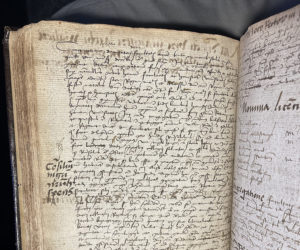
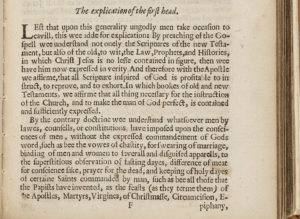
On the 2 June 1640, the Scottish Parliament, closely associated with the reformed Church, brought in the Act discharging the Yule vacance to ensure the country was “purged of all superstitious observatione of dayes” (for the full act see Records of the Parliaments of Scotland to 1707). The Act was partly repealed in 1686 but a second Act was passed on the 19th of July 1690. The records of the Kirk Session of the Church suggest that despite these Acts, many people still enjoyed Christmas, with many being called before the court to make public repentance for taking part in festivities.
The festive period known as the Twelve Days of Christmas, starting on Christmas day and running until Epiphany on the 6th of January, was a time of feasts and games, when landowners would open their halls to the local workers and they in turn would provide gifts. Alice Bertha Gomme in The traditional games of England, Scotland, and Ireland (1894-1898) states that it was customary ‘among Northern nations’ for subjects to present gifts to their sovereign, known as Jolagiafir or Yule gifts.
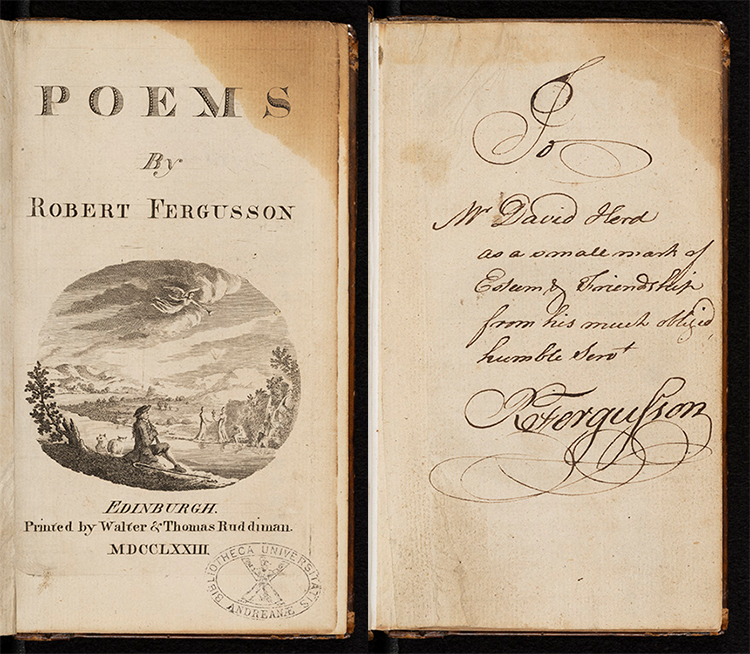
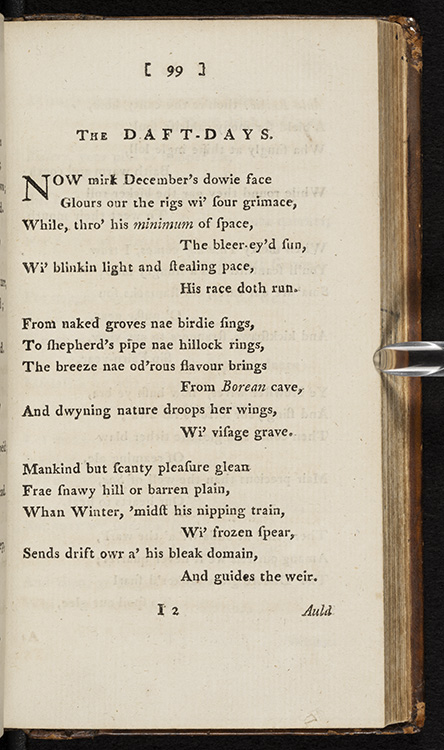
While Christmas day may have fallen out of favour in post-reformation Scotland, the festive period running up to Hogmanay seems to have been celebrated in the 18th century. This period is also known in Scotland as the ‘daft days’, running from the 25th of December up to Handsel Monday (first Monday of the year). The term ‘Handsel’ refers to the custom of exchanging gifts and the word ‘daft’ reflects the opportunity to be more light-hearted during this time. Scottish poet Robert Fergusson penned the poem Daft days, first published in Walter Ruddiman’s Weekly Review (2 January 1772). His collected Poems were published in 1773 and we have a copy of this edition in the library with his personal dedication to David Herd.
Fergusson was student at St Andrews University in 1764-1768. You can see his entry in the matriculation roll here.
Most know The Twelve Days of Christmas as a popular Christmas carol, the lyrics for which were published by Frederic Austin in 1909. It is a cumulative song, with each verse building on the last. The lyrics can be traced back to the children’s book Mirth without Mischief published ca.1780.
The game Twelve Days of Christmas, according to Alice Bertha Gomme, consisted of players recounting the list of objects while adding a new one in each turn. It is thought that the tradition of gift giving during this period, also influenced the song.
There are in fact various versions of the verse, including a Scottish version, known as ‘The Yule days’, published by Robert Chambers in Popular rhymes, fireside stories, and amusements of Scotland (1842).
Robert Chambers (1802-1871) was a Scottish publisher and geologist. A regular visitor to St Andrews, he owned a holiday home on the Scores (Eden Court, 6 Gillespie Terrace), was awarded an honorary degree by the University on the 16 of January 1863 and is buried in the Cathedral grounds.
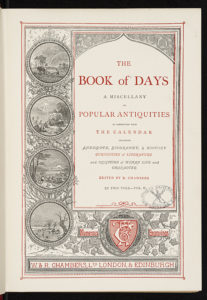 With his brother William, he ran the publishing house, W. R. Chambers in Edinburgh and was the author of a range of works on geology, Scottish history and traditions and was editor of the Book of Days (1863), a miscellany of the traditions throughout the year.
With his brother William, he ran the publishing house, W. R. Chambers in Edinburgh and was the author of a range of works on geology, Scottish history and traditions and was editor of the Book of Days (1863), a miscellany of the traditions throughout the year.
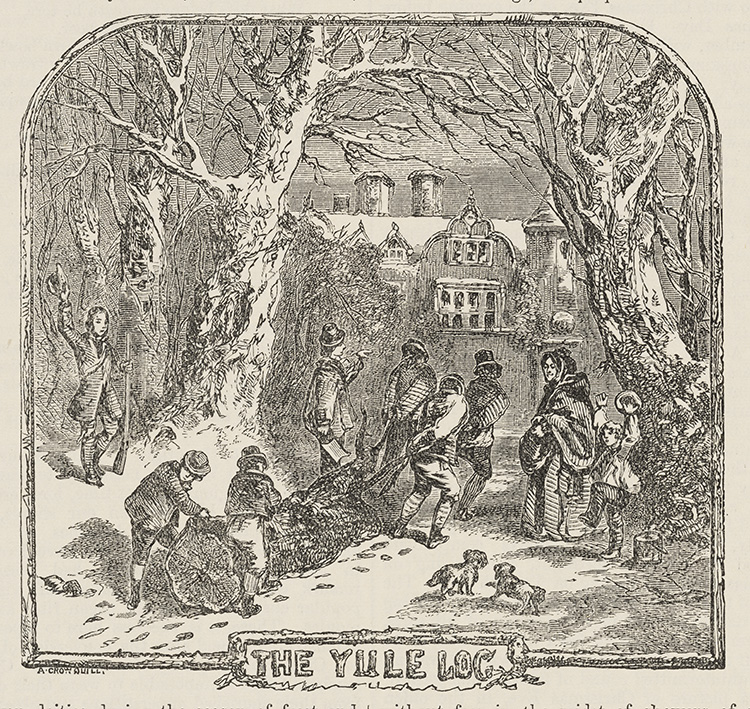
The Yule Days rhyme is to be found in Rhymes of the Nursery section of Chambers work, as shown in the new edition of Popular Rhymes of Scotland (1870) below. In contrast to the more common version of the song, Yule days has thirteen days rather than twelve and includes gifts such as a baboon and peacock.
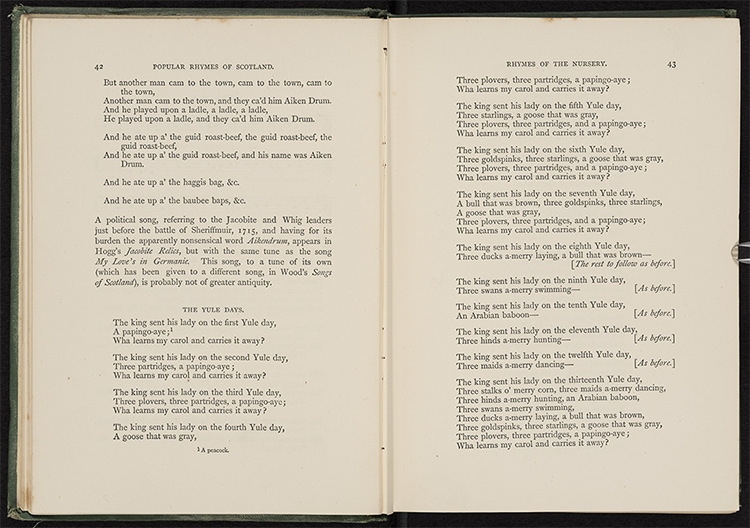
Over the next thirteen days we will share images from our collections on the theme of each of the gifts for the ‘Yule days’ in Chambers’ verse. We hope you enjoy!
References:
Yule. (2013). In W. D. Crump, The Christmas encyclopedia (3rd ed.). McFarland.

'New Year's Eve' is a term that might be used in England and elsewhere, but in Scotland the alternative to Hogmanay is Old Year's Night. We are saying farewell to the year we have lived through.
Dear Duncan, thanks for your comment. We have amended the text by adding in the Scottish alternative to Hogmanay.